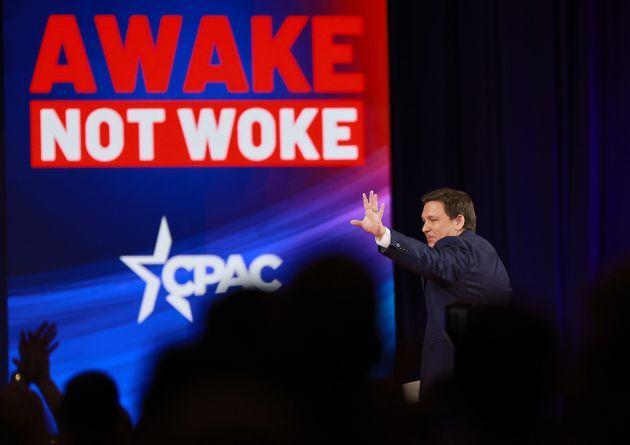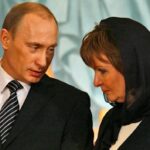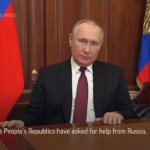ORLANDO ― Five decades after its founding in the era of a Republican who based his presidency on opposing the Soviet Union, the CPAC conference this year will feature at its Ronald Reagan Dinner someone who defends Russian dictator Vladimir Putin ― and did so even as television images showed his missiles striking Ukraine.
“This war and suffering could have easily been avoided if Biden Admin/NATO had simply acknowledged Russia’s legitimate security concerns regarding Ukraine’s becoming a member of NATO,” former Democratic Rep. Tulsi Gabbard wrote late Wednesday night, as Russia’s full-scale invasion of its neighbor began. “Which would mean US/NATO forces right on Russia’s border.”
“She fits in perfectly with where this truth-denying, democracy-hating, authoritarian-embracing cult is today,” said Joe Walsh, a former GOP congressman from Illinois. “I know for certain that Reagan himself wouldn’t attend and wouldn’t at all be happy.”
Gabbard’s appearance during what was once a coveted speaking slot for ambitious Republicans is just one example of the new Putin-friendly stance of modern conservatism on display at the four-day Conservative Political Action Conference.
Another featured speaker is Nigel Farage, a champion of the United Kingdom’s exit from the European Union ― which Putin also supported in his long effort to weaken Western Europe. Farage, who is to speak Friday afternoon, also blamed the U.S. and Western Europe for the invasion, calling it “a consequence of EU and NATO expansion, which came to a head in 2014” in a Thursday tweet.
“It made no sense to poke the Russian bear with a stick,” he added.
Yet the most powerful pro-Putin voice at CPAC will again be that of former President Donald Trump, who after years of admiring Putin from afar spent four years in the White House advancing Putin’s most important goals: weakening NATO and the EU.


Trump ― who in 2007 wrote Putin a letter telling him, “I am a big fan of yours!” ― mused about withdrawing from the defense treaty alliance created by the U.S. following World War II. He frequently lied about how the group functions, claiming, falsely, that other nations “owed” the U.S. years of missed dues. He also attacked the EU, claiming, also falsely, that the free-trade bloc had somehow cheated the U.S.
During his years in office, Trump also repeatedly took Putin’s side over his own intelligence agencies’ regarding Putin’s work to get Trump elected in 2016, including at a post-summit news conference in Helsinki in 2018. A year later, Trump actually defended Putin’s invasion and annexation of Crimea in 2014 because Russia had subsequently built a base for its “large and powerful submarines” there.
Trump’s praise for Putin continued even after he began moving troops into Ukraine this week. On Tuesday, after Russian forces had crossed into the Donbas region, Trump called Putin a “genius” for annexing an entire country for “$2 worth of sanctions.”
As has been the case since Trump began his 2016 presidential campaign, however, his supporters continued to defend him, making excuses for his statements or claiming they meant something else entirely.
“Trump was able to keep Putin in line,” said Linda Memmesheimer, a 68-year-old natural health activist from the Chicago suburbs who is attending the conference.
Gary Adkins, a GOP candidate for Virginia’s 7th Congressional District, blamed Democratic President Joe Biden for the invasion, claiming that Putin and China’s Xi Jinping likely agreed to take advantage of Biden when they met earlier this month.
“They sensed the weakness that was exuding from the White House,” he told HuffPost. As to Trump’s many pro-Putin statements: “Trump has his own way of putting things.”
Republican Sen. Marsha Blackburn of Tennessee also blamed Biden during her remarks on the conference’s opening day. “Their foreign policy is now a war zone,” she said. “Oh, how we pray for the people of Ukraine.”
Many of the speakers, though, took a different approach: ignoring the invasion entirely, even as it dominated news coverage. Florida Gov. Ron DeSantis, while boasting of his anti-mask, anti-vaccine mandate policies and bashing “woke” culture, critical race theory and other favorite boogeymen of the right, mentioned neither Ukraine nor Russia once in his 20-minute speech.
Texas Sen. Ted Cruz, while praising the Canadian truckers protesting vaccine mandates, podcaster Joe Rogan and cryptocurrency, similarly failed to bring up Putin’s invasion during his 18 minutes onstage.
Mark Robinson, the lieutenant governor of North Carolina, extolled gun rights and told the audience: “I bet there’s lots of people around the world who wish they had a Second Amendment in their constitution.”
He was, however, not talking about Ukraine, but Australia and Canada, because of their strict COVID-19 control measures.
Trump, despite losing the 2020 election by 7 million votes nationally and 306-232 in the Electoral College, became the first president in more than two centuries of elections to refuse to hand over power peacefully. His incitement of the Jan. 6 assault on the U.S. Capitol ― his last-ditch attempt to remain in office ― killed five, including one police officer, injured another 140 officers and led to four police suicides.
Despite this, Trump remains the dominant figure in the Republican Party and is openly speaking about running for the presidency again in 2024. He holds the marquee CPAC speaking slot Saturday night.
This article originally appeared on HuffPost and has been updated.




